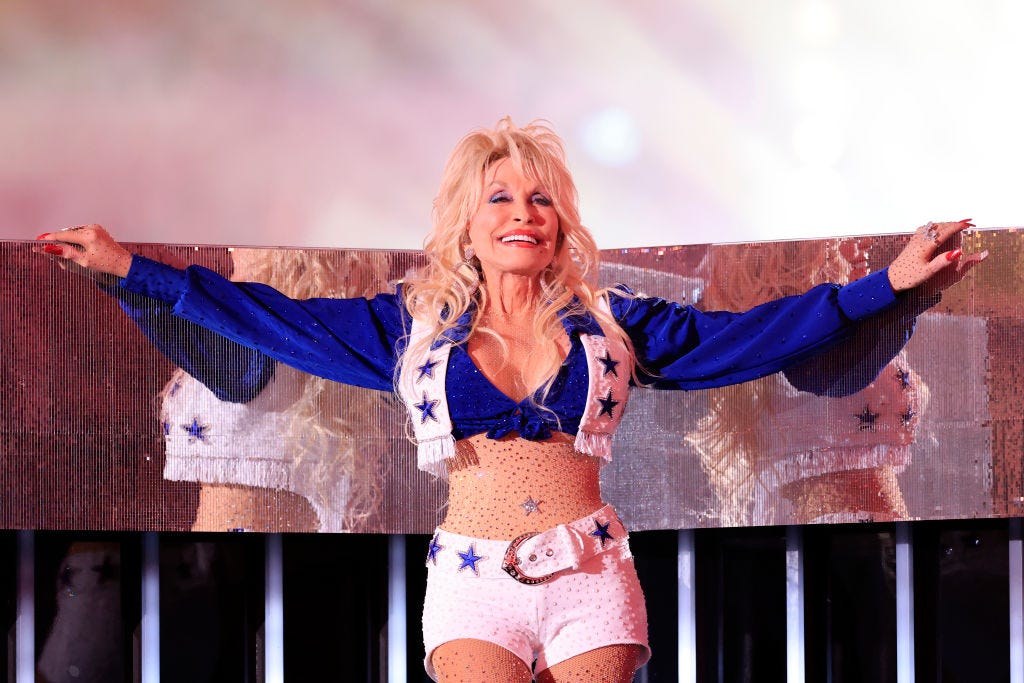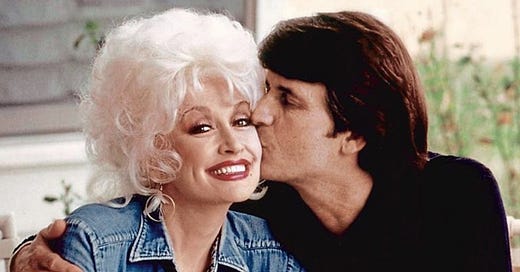
The Free Press

The great Dolly Parton, perhaps America’s last universally beloved public figure, lost her husband of almost 60 years this week. Carl Dean was an asphalt paver from Tennessee who met Parton outside the Wishy Washy laundromat in Nashville in 1964 when she was 18 and he was 21. He died on Monday, at 82.
If you hadn’t heard of Dean, neither has anyone else.
Famous only for his rejection of the spotlight, Dean continued to run his asphalt-paving business as his wife became the most well-known country music star in the world. He refused interviews, avoided awards shows, and was so reclusive that people began to speculate that Parton had made him up. He gave only one interview that I could find, and it was just a few lines summarizing his first meeting with Parton. “My first thought was, I'm gonna marry that girl, ” he said. “My second thought was, Lord she’s good-lookin’. And that was the day my life began. I wouldn’t trade the last 50 years for nothing on this earth.”
In the age of the Power Couple there’s something deeply moving about Dean choosing to live in obscurity. Mating, at least in the higher echelons, has become commodified into a kind of business transaction, where fame is not only currency but the only metric of desire. See: Timothée Chalamet dating Kylie Jenner, Meghan Markle marrying Prince William, or Travis Kelce hitching his wagon to Taylor Swift. I could go on.
Mating, at least in the higher echelons, has become commodified into a kind of business transaction, where fame is not only currency but the only metric of desire.
With few notable exceptions, celebrities—both real and the ersatz social media kind—seem to date and marry only each other. The pursuit of love and the pursuit of fame have become one and the same. How could you possibly date someone with fewer followers? is the new How could you possibly date a man who makes less money than you?
But it’s not just about synergies for social media sponsorships.
Everywhere we look, we’re taught to want a partner who shares not only our values but our goals, our aspirations—for fame and fortune and power. Look at the Clintons and the Obamas, Joe Scarborough and Mika Brzezinski, and Blake Lively and Ryan Reynolds.
All these power couples are in the same industries. They’re expected to be each other’s biggest cheerleader, and co-managers of a collective career.
Dean didn’t even listen to Parton’s music.
“He’s not necessarily one of my biggest fans of my music,” Parton told Good Morning Britain. “He’s proud of me, and he loves that I love what I do,” she went on. “He doesn’t dislike it, but he doesn’t go out of his way to play my records, let’s put it that way.”
It wouldn’t be surprising if Dean had tried to elbow his way into the entertainment world, riding on Parton’s coattails and becoming a manager—even in name only. But that’s not what happened. “He loves music,” Parton said, “but he’s not the least bit interested in being in it.” She credits the success of her marriage with “giving each other space” and not being “in each other’s face all the time.”
Which isn’t to say he didn’t inspire her work—Dean was the spark for “Jolene,” arguably Parton’s most famous song, named for a bank teller who had taken to flirting with her husband. “He just loved going to the bank because she paid him so much attention,” Parton told NPR in 2008. “It was kinda like a running joke between us.”

In short, Parton and Dean shared something deeply private, which remained so for 60 years. “He’s a good guy, and we have a great understanding of each other. We’re great friends,” she said in another interview.
As Parton’s adoring fans piled up by the millions, the only fan that really mattered didn’t care. She won him over thanks to the quirks of her personality rather than the number of followers she had on social media, or the money she had in the bank.
So, I say: Down with the Power Couple. A relationship that exists so publicly, that’s quantified so easily, should strike horror in our hearts, not longing.
What we should always strive for is a life built on mutual understanding, kindness, and respect—not shared goals or admirations. We should all be so lucky to find someone whose interests and success aren’t commodifiable to us, like Carl Dean did.




